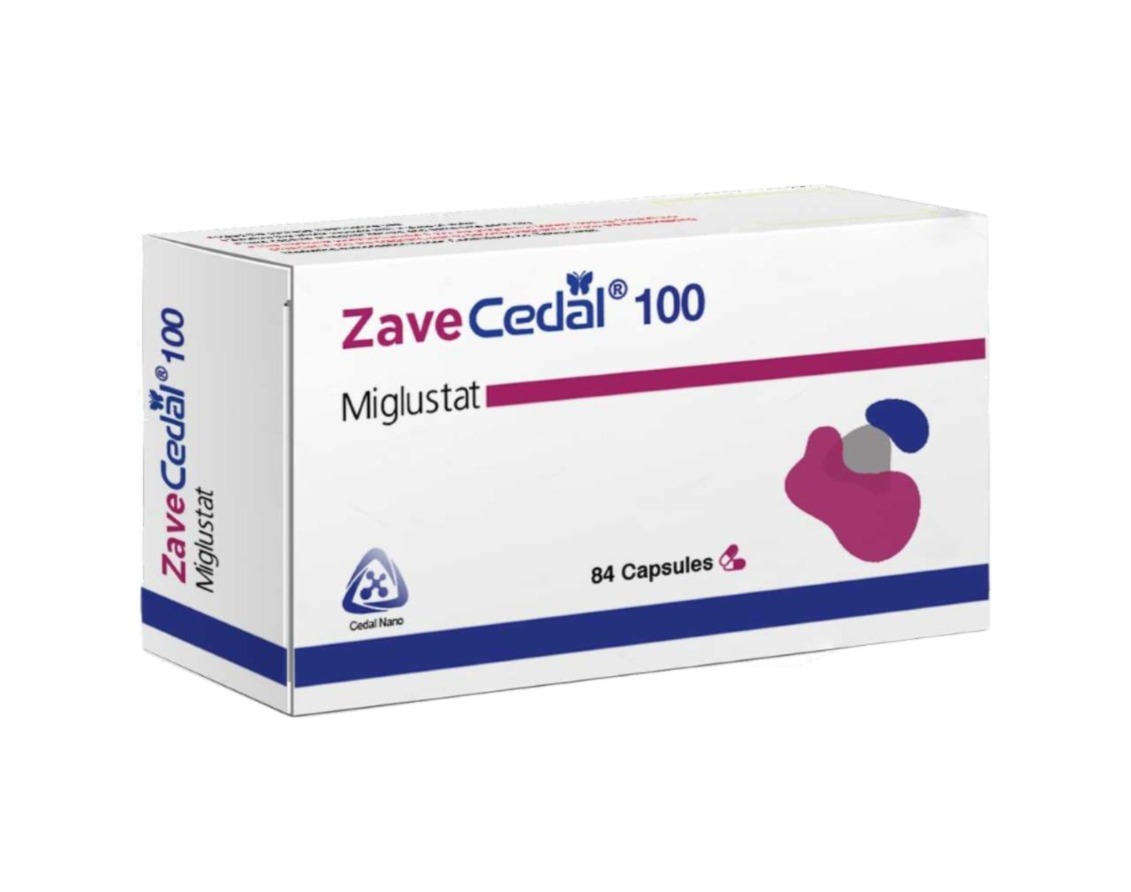- Miglustat is used to treat mild to moderate type 1 Gaucher disease in adults.
In type 1 Gaucher disease, a substance called glucosylceramide is not removed from your body. It starts to build up in certain cells of the body’s immune system. This can result in liver and spleen enlargement, changes in the blood, and bone disease.
The usual treatment for type 1 Gaucher disease is enzyme replacement therapy. Miglustat is only used when a patient is considered unsuitable for treatment with enzyme replacement therapy. - Miglustat is also used to treat progressive neurological symptoms in Niemann-Pick type C disease in adults and in children.
If you have Niemann-Pick type C disease, fats such as glycosphingolipids build up in the cells of your brain. This can result in disturbances in neurological functions such as slow eye movements, balance, swallowing, and memory, and in seizures.
ZaveCedal®
Generic Name
Brand Name
Drug Class
Dosage Form
Indications
Contradications
Warnings and Precautions
Use & Administration
Adverse Effects
Drug Interactions
Pregnancy & Lactation
Storage Conditions
Indications
Contradications
Do not take Miglustat if you are allergic to it.
Warnings and Precautions
Talk to your doctor or pharmacist before taking Miglustat, if you suffer from kidney disease – if you suffer from liver disease
Your doctor will perform the following tests before treatment and during treatment with Miglustat
- an examination to check the nerves in your arms and legs
- measurement of vitamin B12 levels
- monitoring growth if you are a child or adolescent with Niemann-Pick type C disease
- monitoring of blood platelet counts
- The reason for these tests is that some patients have had tingling or numbness in the hands and feet, or a decrease in body weight, while taking Miglustat. The tests will help the doctor decide whether these effects are due to your disease or other existing conditions, or due to side effects of Miglustat.
- If you have diarrhoea, your doctor may ask you to change your diet to reduce your lactose and carbohydrate intake such as sucrose (cane sugar), or not to take Miglustat together with food, or to temporarily reduce your dose. In some cases, the doctor may prescribe anti-diarrhoea medicines such as loperamide. If your diarrhoea does not respond to these measures, or if you have any other abdominal complaint, consult your doctor. In such case, your doctor may decide to conduct further investigations.
- Male patients should use reliable birth control methods during their treatment with Miglustat and for 3 months after finishing treatment.
- Miglustat may make you feel dizzy. Do not drive or use any tools or machines if you feel dizzy.
Use & Administration
Clinically Relevant Interactions
Imiglucerase (enzyme replacement therapy for Gaucher disease)
Concomitant administration may increase the renal clearance of imiglucerase, potentially reducing its therapeutic efficacy.
Routine co-administration is not recommended.
Cytochrome P450–Mediated Interactions
Miglustat is not a clinically significant inhibitor or inducer of CYP450 enzymes.
No relevant interactions have been identified with drugs metabolized by CYP3A4, CYP2D6, CYP2C9, or related pathways.
Food Interaction
Administration with food may delay absorption and reduce peak plasma concentration (Cmax).
This effect is not considered clinically significant but may influence pharmacokinetics.
Alcohol
No specific contraindication identified.
Caution is advised due to potential additive gastrointestinal or neurological effects.
Overall Interaction Profile
Miglustat has a low potential for drug–drug interactions.
Apart from imiglucerase, no clinically meaningful interactions have been documented.
Adverse Effects
Like all medicines, this medicine can cause side effects, although not everybody gets them.
Most serious side effects:
Some patients have had tingling or numbness in the hands and feet (seen commonly). They could be signs of peripheral neuropathy, due to side effects of Miglustat or they could be due to existing conditions. Your doctor will perform some tests before and during treatment with Miglustat to assess this.
If you do get any of these effects, please seek medical advice from your doctor as soon as possible.
Drug Interactions
Tell your doctor or pharmacist if you are taking, have recently taken, or might take any other medicines.
ADVERSE EFFECTS:
Like all medicines, this medicine can cause side effects, although not everybody gets them.
Most serious side effects:
Some patients have had tingling or numbness in the hands and feet (seen commonly). They could be signs of peripheral neuropathy, due to side effects of Miglustat or they could be due to existing conditions. Your doctor will perform some tests before and during treatment with Miglustat to assess this.
If you do get any of these effects, please seek medical advice from your doctor as soon as possible.
Pregnancy & Lactation
- Pregnancy and Breastfeeding
- You should not take Miglustat if you are pregnant or thinking of becoming pregnant. Your doctor can give you more information. You must use effective birth control while taking Miglustat. Do not breast-feed while you are taking Miglustat.
- Male patients should use reliable birth control methods during their treatment with Miglustat, and for 3 months after finishing treatment.
- If you are pregnant, breast feeding, think you may be pregnant or planning to have a baby, ask your doctor or pharmacist for advice before taking this medicine.
- Children And Adolescents
Do not give this medicine to children and adolescents (below 18 years old) with type 1 Gaucher disease because it is not known if it works in this disease.
Storage Conditions
– Store below 30 °C
– Protect from moisture.
– Keep out of the reach of children
Lorem ipsum dolor sit amet, consectetur adipiscing elit. Ut elit tellus, luctus nec ullamcorper mattis, pulvinar dapibus leo.


